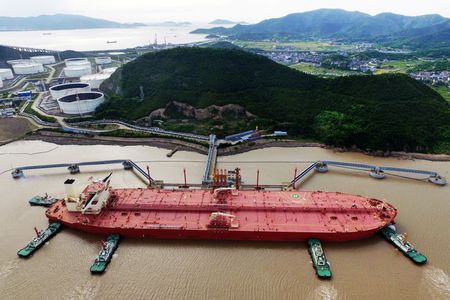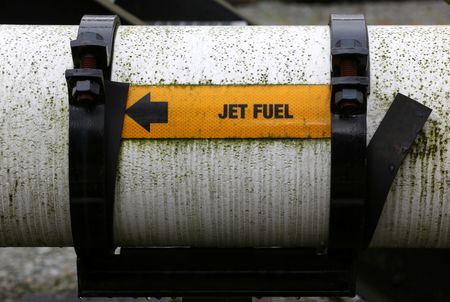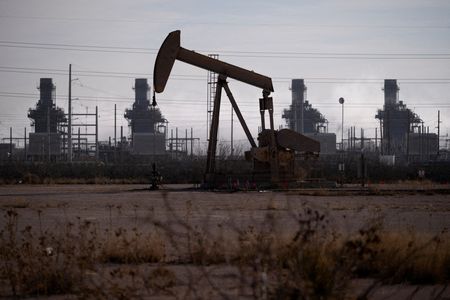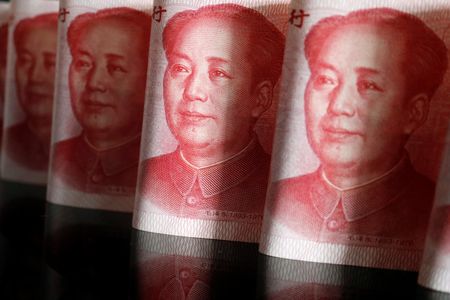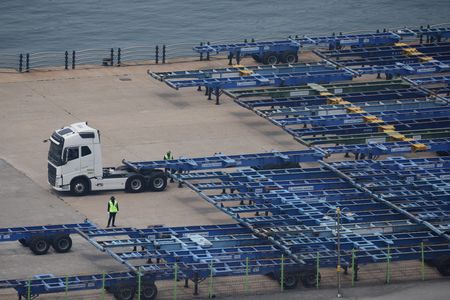By Chen Aizhu
SINGAPORE (Reuters) -China has offloaded nearly four million barrels of Iranian crude oil into state reserve tanks in the southern port city of Zhanjiang over the past few weeks, a trade source and ship tracking specialist Vortexa Analytics said on Thursday.
The move comes as world powers are locked in tough negotiations with Iran to revive a 2015 nuclear deal that will include the lifting of U.S.
sanctions on Iranian oil. The former Trump administration pulled out of the deal and re-imposed sanctions.
Iran, which sits on the world’s fourth-largest oil reserves, relies heavily on oil revenue, but sanctions have prevented it from pumping at anywhere near capacity since 2018.
The refilling of China’s strategic petroleum reserves also comes ahead of a plan to release oil from its emergency stockpile in a rare coordination with the United States to help cool global oil prices which hit a seven-year high this week.
[O/R]
China has previously been importing Iranian oil under the radar, with the shipments not reflected in official customs data as buyers fear invoking U.S. sanctions. On Thursday, China’s customs reported the first import of Iranian crude in a year despite ongoing sanctions.
China brought in 260,312 tonnes (1.9 million barrels) of Iranian crude oil in December, according to data from the General Administration of Chinese Customs, which last recorded Iranian oil inflows in December 2020 at double the volume.
A senior trade source with knowledge of the shipment told Reuters this particular cargo was offloaded into a state reserve site in Zhanjiang in late December.
This was followed by another similar-sized shipment that was discharged into the same port for the emergency stockpile, according to ship tracking specialist Vortexa Analytics.
“There were reports of importing Iranian crude earlier – but hush hush somewhat. Now I think the Chinese are testing openly to see U.S. response,” said Tilak Doshi, managing director of Doshi Consulting in Singapore.
Iran’s oil ministry was not available for comment, but a senior oil ministry official told Reuters that Iran has publicly said its oil exports had increased sharply.
“We do not disclose to which countries because of the U.S. sanctions, but China is one of the countries that buys Iran’s oil. It shows that the sanctions have become ineffective.”
“Our policy is to improve our trade, including oil, with non-Western countries,” said a second Iranian official.
DIPLOMACY BEST
Asked about China storing Iranian oil in state reserves and noting it in customs data – effectively confirming violations of U.S. sanctions – the U.S. State Department said U.S.
sanctions remain in effect and would be enforced, though Washington believed diplomacy was the best way to address the issue.
“We are aware of the purchases that Chinese companies are making of Iranian oil.
We have used our sanctions authorities to respond to Iranian sanctions evasion, including those doing business with China, and will continue to do so if necessary,” said a State Department spokesperson who asked not to be named.
“However, we have been approaching this diplomatically with the Chinese as part of our dialogue on Iran policy and think that, in general, this is a more effective path forward to address our concerns,” the spokesperson added.
China’s National Food and Strategic Reserves Administration did not immediately respond to a request for comment.
“This is (China’s) attempt to cool oil prices.
It’s basically to show the world that there’s more supply even though it’s only available to them,” said a senior oil trader who declined to be identified as he is not authorised to speak to the media.
China’s imports of Iranian oil had continued unofficially despite the sanctions that, if enforced, would allow Washington to cut off those who violate them from the U.S.
economy.
Shipments had held above 500,000 barrels per day on average between August and October, as buyers judged that getting crude at cheap prices outweighed the risks of busting U.S. sanctions, Reuters reported in November.
To avoid the sanctions, Iranian crude has been exported to China marked as oil from Oman, the United Arab Emirates and Malaysia, squeezing out supplies from Brazil and West Africa, traders have said.
Imports from Iran have accounted for about 6% of China’s crude oil imports, according to shipping data and traders’ estimates.
China was expected to release some stocks from its strategic stockpile around the Lunar New Year, Reuters reported last week.
(Reporting by Chen Aizhu; additional reporting by Florence Tan, Muyu Xu, Beijing newsroom, Arshad Mohammed and Tim Gardner in Washington; Parisa Hafezi in dubai; editing by Jason Neely, Florence Tan and David Evans)

